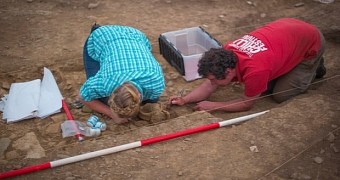Only last year, a team of archaeologists carrying out excavation work in the village of Ipplepen in Devon, UK, unearthed the remains of a Roman road that once crossed the region.
The team has since uncovered wheel ruts, potholes and even artifacts, among them an amphora that was recovered from under the Roman road.
The vessel is estimated to date back to around 2,000 years ago. Although not exactly in top condition when archaeologists found it, it was nonetheless pulled from the ground intact.
“The amphora had lots of 2,000 year old fractures, so we had to lift it very carefully. As you can imagine, it was a relief when we got it out in one piece,” said University of Exeter researcher Danielle Wootton.
The ancient vessel is the creation of pottery workers on the continent. Judging by its design, researchers believe that, during the days of the Roman Empire, it served to hold olive oil or maybe wine.
A better understanding of the history of the region
The discovery of this Roman road in the village of Ipplepen in Devon, along with the amphora and the other artifacts scattered along it, has helped researchers better understand the history of the region.
As explained by University of Exeter archaeologist Danielle Wootton and colleagues, the road is proof of interactions between Romans and the local ancient British population.
“The Roman road revealed last summer forms part of the largest known Romano-British activity in Devon outside of Exeter,” the research team explains.
Efforts are now underway to identify rural houses or maybe even entire settlements that once stood by the side of this recently unearthed Roman road in present-day England.
If found, the remains of these communities that archaeologists suspect thrived in the area millennia ago should produce even more artifacts revealing what life was like during Roman times.

 14 DAY TRIAL //
14 DAY TRIAL //